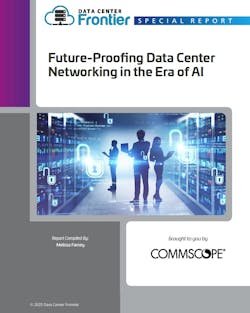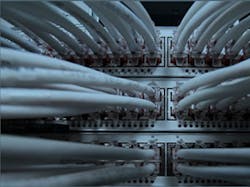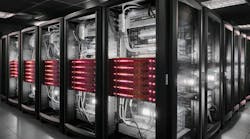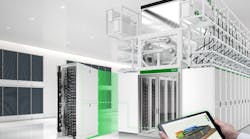The Future of Data Center Networking in the AI Era
We conclude our article series on future-proofing data center networking in the era of AI. This week, we’ll discuss the future of data center networking in the AI era.
The next few years will see data center networks evolve at an unprecedented pace, shaped by the explosive growth of AI workloads and the need for smarter, more efficient infrastructure. Several trends and predictions stand out as defining the future of how data centers will connect, scale, and operate.
Photonics will become a cornerstone of next-generation data center networks. The adoption of co-packaged optics and onboard optical modules, where optical transceivers are integrated directly onto switch circuit boards, will enable significantly higher bandwidths (800 G, 1.6 T, and beyond) while reducing both power consumption and physical space requirements. This technology shift is crucial as AI clusters demand denser interconnects and lower latency, and it will help future-proof data centers for the bandwidth needs of emerging AI applications.
The rise of edge computing will drive a more decentralized data center topology, with smaller facilities located closer to end users to support real-time AI inference and latency-sensitive applications. This will require robust, high-speed interconnects between core and edge sites, as well as seamless network orchestration to manage distributed workloads. Operators will need to rethink network design to ensure consistent, low- latency communication across geographically dispersed nodes.
AI will increasingly be used not just as a workload but as a management tool within data centers. Predictive analytics, AI-based congestion control, and automated network optimization will become standard, enabling real-time adjustments to traffic flows, rapid fault detection, and dynamic resource allocation. This will be essential to maintain performance as networks become more complex and traffic patterns more unpredictable.
As new protocols and hardware emerge, industry standards will play a vital role in ensuring interoperability across diverse network devices and platforms. The push toward open, standardized interfaces, such as those promoted by the Ultra Ethernet Consortium, will make it easier to integrate new technologies as they become available, reducing vendor lock-in and simplifying upgrades.
Conclusion and Recommendations
The evolution of data center communications is being driven at an unprecedented pace by the rise of AI workloads, which demand exponentially greater bandwidth, ultra-low latency, and flexible, scalable infrastructure. Traditional data center architectures and protocols are no longer sufficient to support the parallelism and data intensity of modern AI training and inference. Key challenges include managing the explosive growth in data volume and network traffic, ensuring reliability and uptime, integrating new technologies into legacy environments, and future- proofing infrastructure to accommodate rapid advances in AI hardware and networking standards.
As the industry moves forward, leveraging CommScope’s Propel platform provides a future-proof foundation for AI-ready data centers. These solutions are engineered to handle the high-density, high-speed connectivity that AI workloads require, with a particular emphasis on 16-count fiber technologies that streamline cabling, enhance scalability, and support the next generation of AI-driven applications. By embracing these innovations, data center operators can ensure their infrastructure remains resilient, efficient, and ready to capitalize on the opportunities of the AI era.
Download the full report, Future-Proofing Data Center Networking in the Era of AI, featuring CommScope, for exclusive content, including five actionable strategies data center engineers and managers should prioritize.
About the Author

Melissa Reali
Melissa Reali is an award-winning data center industry leader who has spent 20 years marketing digital technologies and is a self-professed data center nerd. As Editor at Large for Data Center Frontier, Melissa will be contributing monthly articles to DCF. She holds degrees in Marketing, Economics, and Psychology from the University of Central Florida, and currently serves as Marketing Director for TECfusions, a global data center operator serving AI and HPC tenants with innovative and sustainable solutions. Prior to this, Melissa held senior industry marketing roles with DC BLOX, Kohler, and ABB, and has written about data centers for Mission Critical Magazine and other industry publications.




